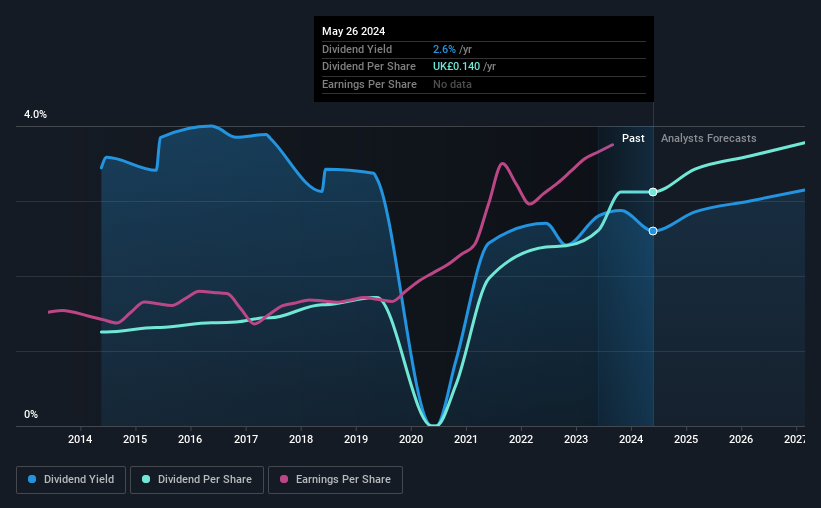Bloomsbury Publishing (LON:BMY) Has Announced That It Will Be Increasing Its Dividend To £0.1099
The board of Bloomsbury Publishing Plc (LON:BMY) has announced that the dividend on 23rd of August will be increased to £0.1099, which will be 6.3% higher than last year's payment of £0.103 which covered the same period. This takes the annual payment to 2.6% of the current stock price, which is about average for the industry.
See our latest analysis for Bloomsbury Publishing
Bloomsbury Publishing's Payment Has Solid Earnings Coverage
We like a dividend to be consistent over the long term, so checking whether it is sustainable is important. Based on the last payment, Bloomsbury Publishing was quite comfortably earning enough to cover the dividend. This means that a large portion of its earnings are being retained to grow the business.
The next year is set to see EPS grow by 20.0%. Assuming the dividend continues along recent trends, we think the payout ratio could be 51% by next year, which is in a pretty sustainable range.
Dividend Volatility
Although the company has a long dividend history, it has been cut at least once in the last 10 years. Since 2014, the annual payment back then was £0.0564, compared to the most recent full-year payment of £0.14. This works out to be a compound annual growth rate (CAGR) of approximately 9.5% a year over that time. We like to see dividends have grown at a reasonable rate, but with at least one substantial cut in the payments, we're not certain this dividend stock would be ideal for someone intending to live on the income.
The Dividend Looks Likely To Grow
Growing earnings per share could be a mitigating factor when considering the past fluctuations in the dividend. Bloomsbury Publishing has impressed us by growing EPS at 18% per year over the past five years. The company is paying a reasonable amount of earnings to shareholders, and is growing earnings at a decent rate so we think it could be a decent dividend stock.
We Really Like Bloomsbury Publishing's Dividend
Overall, a dividend increase is always good, and we think that Bloomsbury Publishing is a strong income stock thanks to its track record and growing earnings. Earnings are easily covering distributions, and the company is generating plenty of cash. Taking this all into consideration, this looks like it could be a good dividend opportunity.
Companies possessing a stable dividend policy will likely enjoy greater investor interest than those suffering from a more inconsistent approach. At the same time, there are other factors our readers should be conscious of before pouring capital into a stock. For example, we've picked out 2 warning signs for Bloomsbury Publishing that investors should know about before committing capital to this stock. Looking for more high-yielding dividend ideas? Try our collection of strong dividend payers.
Have feedback on this article? Concerned about the content? Get in touch with us directly. Alternatively, email editorial-team (at) simplywallst.com.
This article by Simply Wall St is general in nature. We provide commentary based on historical data and analyst forecasts only using an unbiased methodology and our articles are not intended to be financial advice. It does not constitute a recommendation to buy or sell any stock, and does not take account of your objectives, or your financial situation. We aim to bring you long-term focused analysis driven by fundamental data. Note that our analysis may not factor in the latest price-sensitive company announcements or qualitative material. Simply Wall St has no position in any stocks mentioned.

 Yahoo Finance
Yahoo Finance 
